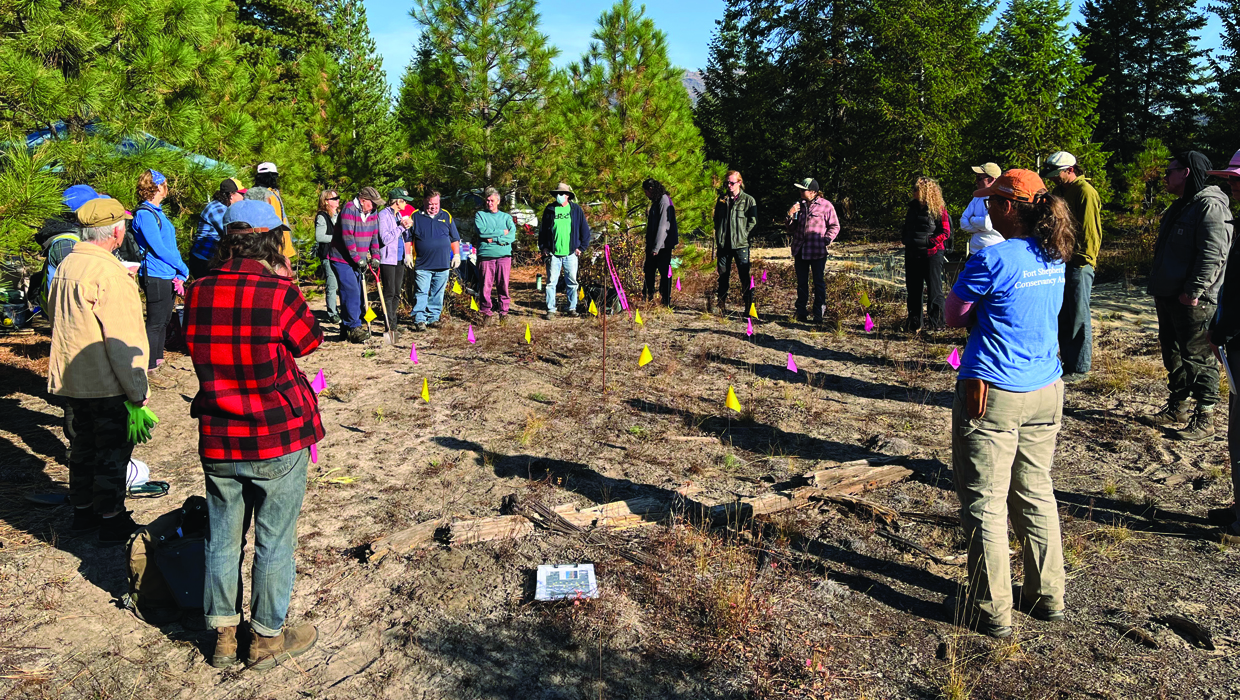NEWS RELEASE
VOLUNTEERS ADD 1,000 NATIVE PLANTS TO FORT SHEPHERD CONSERVANCY AREA
Local conservation groups contribute to Welcome Back Monarchs event in support of native pollinators
FOR IMMEDIATE RELEASE: November 9, 2022
Trail, B.C. –The Land Conservancy of British Columbia (TLC) and Sinixt Confederacy welcomed partners in conservation Kootenay Native Plant Society (KNPS), Rotary Club of Waneta Sunshine, and community volunteers for a day of habitat restoration at Fort Shepherd Conservancy Area this fall. The Welcome Back Monarchs planting day was part of KNPS’s Pollination Pathway initiative and TLC’S Fort Shepherd Conservancy Area’s ongoing land stewardship programming.
Historically, Fort Shepherd Conservancy Area has experienced loss of biodiversity and degradation from industrial pollution and off-road vehicle use. Thankfully, the Conservancy Area is starting to see improvements due to recent restoration efforts made by local community and conservation groups. During the one-day restoration event, 23 volunteers put over 1,000 native plants including Showy Milkweed (Asclepias speciosa), ʔi̓ʔtx̌ʷǎʔ (Camas, Camassia quamash), Parsnip-flowered Buckwheat (Eriogonum heracleoides), and Silky Lupine (Lupinus sericeus), as well as one million seeds, into the soils of the lower benches of the Conservancy Area.
Native pollinators are essential components to our natural ecosystems but are tragically experiencing a decline in numbers because of loss of habitat and the impacts of climate change. Many animals depend on insect pollinated fruit and seed including the Conservancy Area’s birds, bears, bats, and ungulates. Native plants and pollinators have adapted to their local soils, climates, and to one another; this diversity of native plants provide the foundations for a healthy habitat for all living organisms at Fort Shepherd.
Shelly Boyd, Arrow Lakes Facilitator at Confederated Tribes of the Colville Reservation, welcomed volunteers saying, “I’m so grateful that so many of you showed up to help the land heal.”
TLC recognizes the Habitat Conservation Trust Foundation and the Government of British Columbia for contributing to the Fort Shepherd Conservancy Area land stewardship project. Without such support, this project would not have been possible. Special thanks to funding support from the Columbia Basin Trust, Environment and Climate Change Canada, Rotary Club of Waneta Sunshine, and Teck Trail Operations (Teck Resources Ltd.) for their generous contribution of $1,500 toward plant purchases.
TLC welcomes community volunteer groups to Fort Shepherd Conservancy to participate in helping their local ecosystems thrive. Contact Karen Iwachow, TLC’s Environmental Technician and Land Manager, at 1-877-485-2422 or membership@conservancy.bc.ca for more information. Fort Shepherd Conservancy Area is open to the public for hiking and horseback riding on the main access road only from May 1 to October 31.
About Fort Shepherd Conservancy Area:
Fort Shepherd Conservancy Area is 964 hectares of grasslands, dry forests, rocky slopes, cliffs, and caves running along more than eight kilometres of the Columbia River. Located just six kilometres south of Trail, the area provides habitat to numerous species-at-risk including Great Blue Herons, Nighthawks, Canyon Wrens, Townsend’s Big-Eared Bats and Racer Snakes. The area also provides a valuable refuge for Mule Deer and Elk. Open to the public for the season on May 1, visitors are asked to remain on the main road while enjoying limited recreational use including fishing, hiking, horseback riding, and picnicking on the property. No harvesting of species, fires, or overnight camping are permitted on site. Bicycling and dogs on leash will be permissible on a trial basis.
About The Land Conservancy of British Columbia:
The Land Conservancy of BC (TLC) is a non-profit, charitable Land Trust working throughout British Columbia. TLC’s primary mandate is to benefit the community by protecting habitat for natural communities of plants and animals. Founded in 1997, TLC is membership-based and governed by an elected, volunteer Board of Directors. TLC relies on a strong membership, donor and volunteer base to help maintain its operations.



